The Sour Truth: Can Cats Eat Sourdough Bread Safely? A Vet-Reviewed Guide
- 14 Apr 2025 11:02
The artisanal appeal of sourdough bread, with its tangy flavor and chewy crust, has made it a household favorite. As you slice into a fresh loaf, the yeasty aroma might attract your feline companion, leading you to wonder: can cats eat sourdough bread? It seems relatively plain compared to other human foods, but when it comes to our obligate carnivore pets, even seemingly simple items warrant close examination.
The answer is complex and leans heavily towards **no, cats should not eat sourdough bread**, especially not the raw dough. While a tiny nibble of plain, cooked sourdough bread might not cause immediate severe toxicity, it offers no nutritional benefits and carries potential risks. Furthermore, raw sourdough dough or starter is exceptionally dangerous for cats. This comprehensive guide, grounded in veterinary knowledge and adhering to E-E-A-T principles (Experience, Expertise, Authoritativeness, Trustworthiness), will explore the unique properties of sourdough, the fundamental incompatibility of bread with feline nutrition, the severe dangers of raw dough, and why safer alternatives are always the better choice.
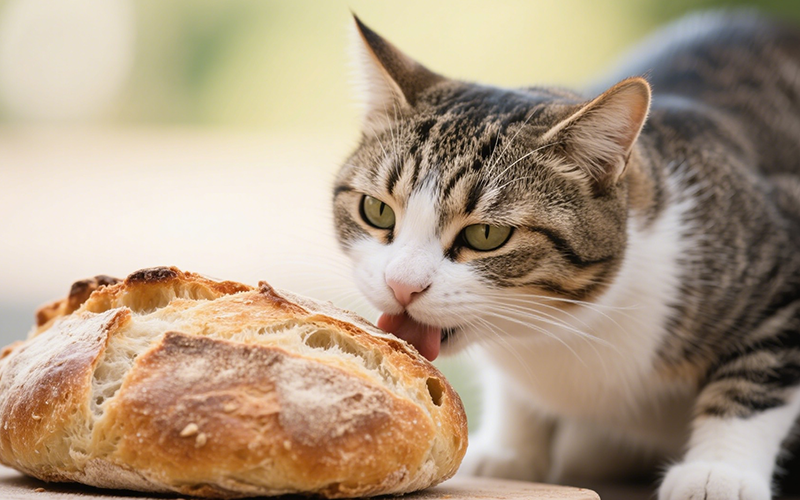
What Makes Sourdough Different? Understanding Fermentation
Sourdough bread stands apart from standard commercial loaves due to its leavening process. Instead of using commercial baker's yeast, sourdough relies on a "starter" – a symbiotic culture of wild yeasts and lactic acid bacteria (LAB) that naturally occur on flour and in the environment. Key aspects include:
Natural Fermentation: Wild yeasts produce carbon dioxide (CO2) which makes the bread rise, while LAB produce lactic acid and acetic acid, contributing the characteristic tangy flavor and improving preservation.
Ingredients: Basic sourdough contains only flour, water, salt, and the active starter culture.
Digestibility (for Humans): The long fermentation process breaks down some gluten and phytic acid, potentially making sourdough slightly easier for *some humans* to digest compared to standard bread. This benefit does **not** significantly apply to cats.
Acidity: The presence of lactic and acetic acids makes sourdough more acidic than regular bread.
While fascinating, this fermentation process introduces specific risks for cats, particularly concerning the raw dough and starter.
Feline Nutrition vs. Bread Reality Check: Why Cats Aren't Bakers' Buddies
Before diving into sourdough specifics, we must reiterate the core principles of feline nutrition. Cats are **obligate carnivores**. Their entire biological system is designed for a meat-based diet:
High Protein Needs: They require high levels of animal protein for energy, muscle structure, and vital functions. Plant proteins (like gluten in flour) are incomplete and poorly utilized.
Essential Nutrients from Meat: Critical nutrients like taurine, arachidonic acid, pre-formed Vitamin A, and certain B vitamins must come from animal sources. Bread lacks these entirely.
Low Carbohydrate Requirement/Tolerance: Cats have minimal need for carbohydrates. Their digestive system isn't equipped with the necessary enzymes (like ample amylase) to efficiently break down starches found in flour.
Energy Source: They primarily derive energy from protein and animal fats, not carbohydrates.
Bread, including sourdough, is fundamentally composed of carbohydrates (flour) and offers virtually nothing essential for a cat's health. It's essentially "junk food" for an obligate carnivore.
Can Cats Eat *Cooked* Sourdough Bread? (The Nuanced Answer)
What about a piece of the finished, baked loaf? Is it safe?
Non-Toxic (Generally): Plain, fully cooked sourdough bread (containing only flour, water, salt, inactive starter) is generally considered non-toxic in tiny amounts. A small crumb accidentally ingested likely won't cause poisoning.
Still Unsuitable & Risky:** Despite being non-toxic, it's **not recommended** for several reasons:
High Carbohydrates:** As discussed, cats digest carbs poorly. Eating bread can lead to **gastrointestinal upset** (gas, bloating, diarrhea, vomiting).
Lack of Nutritional Value:** It provides empty calories with none of the essential proteins, fats, vitamins, or minerals cats need.
Sodium Content:** Even homemade sourdough contains salt, which contributes to the overall sodium load. Commercial sourdough or bread products often contain much higher levels, posing a risk (see below).
Acidity:** The characteristic acidity of sourdough could potentially irritate a sensitive cat's stomach lining, though this is less of a concern than the carbs or salt.
Potential Allergens/Sensitivities:** Wheat/gluten can be allergens for some cats.
Therefore, while a tiny piece of plain cooked sourdough might not cause immediate harm, it offers no benefits and carries risks, making it an inappropriate treat.
THE MAJOR DANGER: Raw Sourdough Dough & Starter – **LIFE-THREATENING EMERGENCY**
This cannot be stressed enough: **Raw, yeasted dough (including sourdough starter and proofing dough) is EXTREMELY DANGEROUS and potentially fatal if ingested by cats.** The warm, moist environment of a cat's stomach provides perfect conditions for the live yeasts (and bacteria in sourdough) to continue fermenting.
This leads to two critical, life-threatening issues:
1. Ethanol (Alcohol) Poisoning
Fermentation Process:** As the yeasts ferment the carbohydrates (sugars) in the dough, they produce carbon dioxide (CO2) gas and **ethanol (alcohol)**.
Rapid Absorption:** Alcohol is rapidly absorbed into the cat's bloodstream from the stomach.
Extreme Sensitivity:** Cats are highly sensitive to ethanol. Their small body size and different metabolism mean even small amounts produced by fermenting dough can cause severe poisoning.
Symptoms of Alcohol Poisoning in Cats:** Can appear quickly and include:
Drowsiness, lethargy
Loss of coordination (ataxia), stumbling, appearing "drunk"
Vomiting or retching
Disorientation
Weakness
Slowed breathing (respiratory depression)
Low body temperature (hypothermia)
Low blood sugar (hypoglycemia)
In severe cases: seizures, respiratory failure, coma, death.
2. Gas Production & Bloat (Potential GDV Risk)
CO2 Buildup:** The other major byproduct of yeast fermentation is carbon dioxide gas.
Stomach Distension:** This gas causes the ingested dough mass to expand rapidly within the stomach, leading to severe bloating and abdominal pain.
Risk of GDV:** This extreme distension can potentially lead to Gastric Dilatation-Volvulus (GDV), where the stomach twists on itself. GDV cuts off blood supply to the stomach and spleen, prevents gas from escaping, and rapidly leads to shock, tissue death, and often fatality if not treated immediately with emergency surgery. While GDV is much more common in large-breed dogs, it *can* occur in cats, especially under conditions of rapid gas buildup like that from raw dough ingestion.
Symptoms of Bloat/Potential GDV:**
Distended, hard, painful abdomen
Retching or unproductive vomiting (trying to vomit but nothing comes up)
Drooling
Restlessness, pacing
Difficulty breathing
Pale gums
Collapse
**Action Required: If you suspect your cat has ingested ANY amount of raw sourdough dough or active starter, it is a VETERINARY EMERGENCY. Go to your nearest emergency vet clinic immediately.** Time is critical.
Other Hidden Risks in Sourdough & Bread Products
Beyond the dough itself, other factors make sourdough and related products risky:
High Sodium Content
Salt is essential for sourdough flavor and structure.
Risk:** Excessive salt intake can cause sodium ion poisoning (hypernatremia) in cats, leading to neurological signs (tremors, seizures), vomiting, diarrhea, increased thirst, and kidney strain.
Source:** Both homemade and especially commercially produced sourdough breads or crackers can be high in salt.
Added Ingredients in Specialty Loaves
Many artisan sourdough loaves contain additions that are dangerous for cats:
Garlic & Onions:** Often added for flavor, these are highly toxic, causing red blood cell damage and anemia.
Raisins & Grapes:** Extremely toxic to cats and dogs, causing acute kidney failure.
Nuts (especially Macadamia):** Some nuts are toxic; others pose choking or GI obstruction risks.
Seeds:** While some seeds are benign, others can cause issues or be coated in harmful substances.
Cheese:** Adds fat and lactose (most cats are lactose intolerant).
Xylitol:** This artificial sweetener (sometimes found in low-carb or keto bread products, though less common in traditional sourdough) is extremely toxic, causing hypoglycemia and liver failure. **Always check ingredients if feeding any human baked good.**
High Fat / Added Sugars
Some enriched sourdoughs or related pastries might contain added butter, oil, or sugars.
Risk:** High fat increases the risk of pancreatitis and GI upset. Added sugars contribute to obesity and are unhealthy.
Mold Contamination
Moldy bread (any type) should never be fed to cats.
Mycotoxins:** Molds produce mycotoxins that can cause serious illness, including tremors, seizures, vomiting, and organ damage.
What About Sourdough Discard?
Sourdough discard (the portion removed before feeding the starter) is essentially raw flour and water, possibly with some residual yeast/bacterial activity depending on its state. It carries similar, though potentially lesser, risks as active starter or raw dough if ingested raw (fermentation potential, raw flour indigestibility). It's not recommended for cats. If used in cooked recipes, ensure the final product contains only cat-safe ingredients and is fully cooked.
Accidental Ingestion: What To Do Summary
Raw Dough or Active Starter Eaten:** **IMMEDIATE VETERINARY EMERGENCY.** Go directly to the nearest emergency clinic. Inform them of potential ethanol poisoning and bloat/GDV risk.
Small Amount of Plain Cooked Bread Eaten:** Remove access to more. Provide fresh water. Monitor closely for 24-48 hours for vomiting, diarrhea, gas, or lethargy. Call your vet if symptoms occur or if you are concerned.
Cooked Bread with Risky Ingredients Eaten (Garlic, Onion, Raisins, Xylitol):** Call your veterinarian or Pet Poison Helpline IMMEDIATELY. These ingredients are toxic.
Do not induce vomiting unless specifically instructed by a veterinarian.
Better Bites: Safe & Healthy Alternatives for Curious Cats
Instead of sharing potentially harmful bread, offer treats suitable for your obligate carnivore:
Small Pieces of Plain Cooked Meat:** Unseasoned chicken, turkey, lean beef, lamb, fish (boneless).
High-Quality Commercial Cat Treats:** Meat-based, low-carb options.
Freeze-Dried Meat Treats:** Excellent single-ingredient snacks.
Lickable Treats:** Highly palatable and good for bonding.
Dental Health Treats:** Can offer oral benefits.
Cat Grass:** Safe greens for nibbling.
These provide safe enjoyment and align with your cat's nutritional needs, unlike cats eating sourdough bread.
Veterinary Perspective on Sourdough Bread and Cats
Veterinarians strongly advise against feeding sourdough bread to cats, emphasizing:
The **extreme danger of raw sourdough dough and starter** due to ethanol production (alcohol poisoning) and gas buildup (bloat/GDV risk), classifying ingestion as an emergency.
The **nutritional inappropriateness of cooked bread** (high carbs, low essential nutrients) for obligate carnivores.
The potential for **gastrointestinal upset** from cooked bread due to poor carbohydrate digestion.
The significant risk of **toxicosis from added ingredients** commonly found in bread products (salt, garlic, onions, raisins, xylitol).
The clear recommendation to **stick to species-appropriate diets and treats**.
The professional consensus is unequivocal: sourdough bread, especially raw dough, poses unacceptable risks to feline health.
Sourdough Bread & Cats: Quick Safety Summary
| Aspect | Safety Information & Recommendations |
| Can Cats Eat Sourdough Bread (Cooked)? | Non-toxic in tiny amounts if plain, but **NOT recommended.** High carbs, low nutrition, risks GI upset. |
| Raw Sourdough Dough / Starter | **EXTREMELY DANGEROUS / EMERGENCY.** Risks severe **Ethanol (Alcohol) Poisoning** and **Bloat/GDV** due to yeast fermentation in stomach. **Never allow access.** |
| Harmful Components | Raw Dough (Yeast, Ethanol, Gas), Cooked Bread (Carbs, Salt, Potential Additives like Garlic/Onion/Raisins/Xylitol). |
| Nutritional Value for Cats | Virtually none. Lacks essential feline nutrients. Provides empty calories. |
| Symptoms of Raw Dough Ingestion | Drunkenness (ataxia), lethargy, vomiting, respiratory depression, bloat, pain, retching, collapse. **Emergency!** |
| Symptoms of Cooked Bread Issues | GI upset (vomiting, diarrhea, gas). If toxic ingredients eaten, signs relate to that toxin (e.g., anemia from onion/garlic). |
| Action if Eaten | Raw Dough/Starter -> **IMMEDIATE Emergency Vet**. Cooked Bread -> Monitor; call vet if symptoms or risky ingredients involved. |
| Recommendation | **Strictly AVOID** feeding sourdough (raw or cooked). Keep dough/starter securely away from cats. Offer safe, species-appropriate treats. |
Facing Pet Health Emergencies or Questions? PettureX Can Help!
Understanding the potential dangers of human foods, like the critical risks associated with raw sourdough dough for cats, is vital. If your cat ingests something potentially harmful, panic can ensue. Having access to quick information and guidance is invaluable while you seek immediate professional veterinary care – your primary resource in any emergency.
The PettureX App offers modern tools for concerned pet parents:
24/7 AI Vet Consultation: Get immediate AI-powered answers to urgent questions like "What do I do if my cat ate raw dough?" or help interpreting symptoms like staggering or bloating, guiding you on urgency while you contact an emergency clinic.
Image Recognition Technology: Useful for breed identification or assessing visible health issues.
AI-Powered Symptom Checker: Describe your cat's symptoms (e.g., lethargy, retching, distended abdomen) for an AI analysis of potential causes, including poisoning or GDV, helping you communicate critical information effectively to your vet.
Extensive Pet Health Database: Quickly find information on toxic substances, emergency situations, and general feline health.
PettureX provides convenient AI-driven support and information, serving as a helpful resource alongside the essential, immediate care provided by your veterinarian, especially in emergencies.
Conclusion: Keep Sourdough Away - Especially the Raw Dough!
In conclusion, while the tangy aroma of sourdough might tempt both you and your cat, the answer to "can cats eat sourdough bread?" is a strong recommendation to keep it away from them. Cooked sourdough bread offers no nutritional value, is difficult for cats to digest, and carries risks related to salt and potential hidden ingredients. It should not be offered as a treat.
More critically, **raw sourdough dough and active starter are extremely dangerous and potentially fatal** due to the risk of ethanol (alcohol) poisoning and severe bloat potentially leading to GDV. Ingestion constitutes a veterinary emergency requiring immediate action.
Protect your cat by ensuring all bread products, especially raw dough and starters, are kept securely out of reach. Stick to feeding a complete and balanced commercial cat food and offering only safe, species-appropriate treats. Your cat's health depends on respecting their unique needs as obligate carnivores.
Related
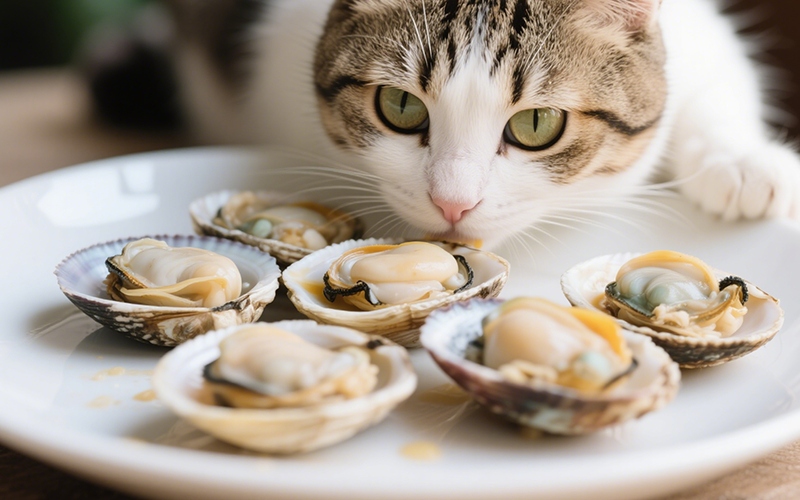
Seafood Surprise: Can Cats Eat Clams Safely? (Vet-Reviewed Risks & Guide)
- 15 Apr 2025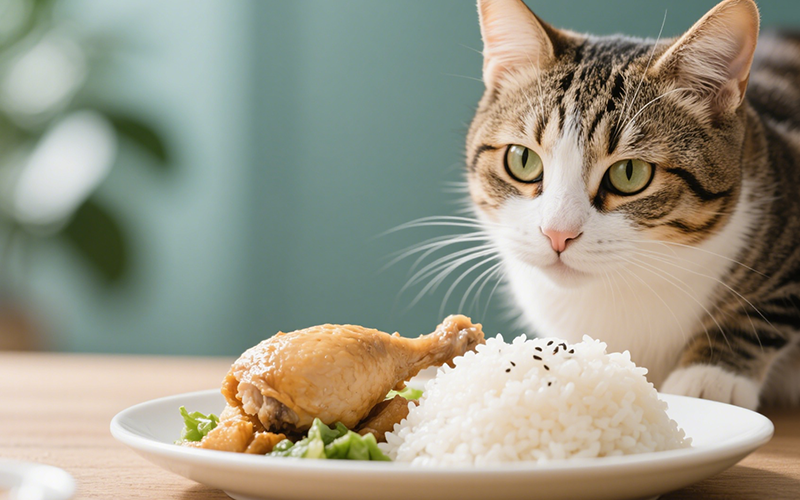
Chicken & Rice for Cats: Safe Treat or Dietary Danger? (Vet-Reviewed Guide)
- 15 Apr 2025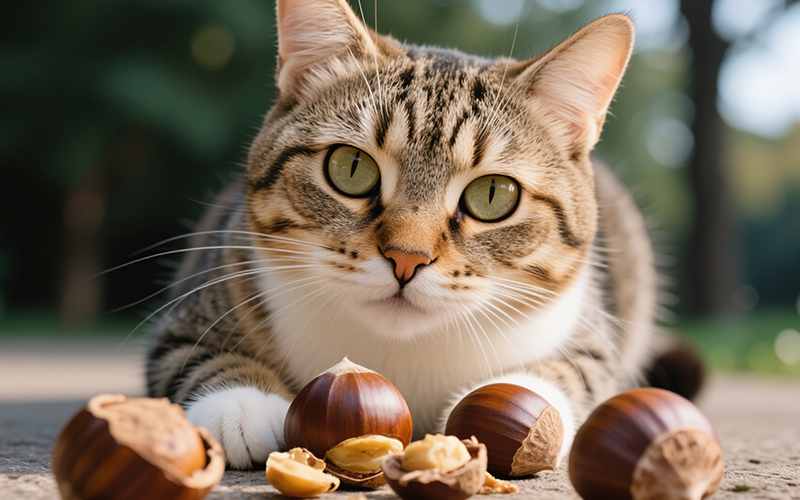
Nutty Concerns: Can Cats Eat Chestnuts Safely? Vet Explains the Risks (True vs. Horse Chestnuts)
- 15 Apr 2025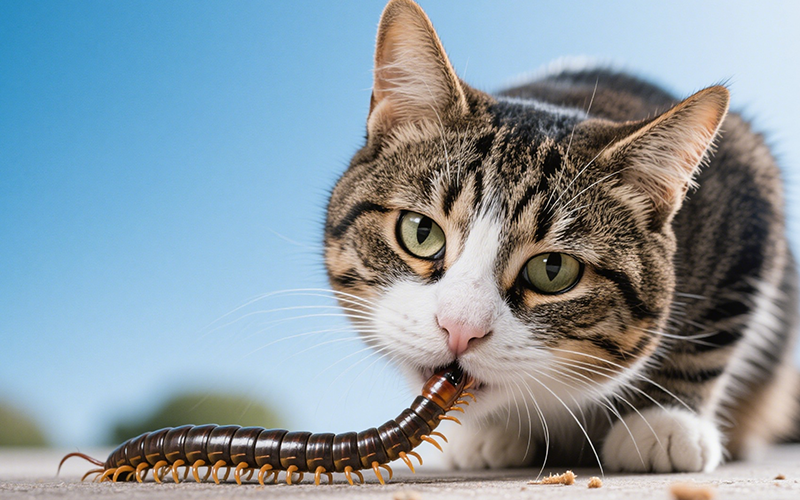
Creepy Crawly Cuisine? Can Cats Eat Centipedes Safely? (Vet-Reviewed Warning)
- 15 Apr 2025
The Gourd Guide: Can Cats Eat Canned Pumpkin Safely? Vet-Reviewed Benefits & Risks
- 15 Apr 2025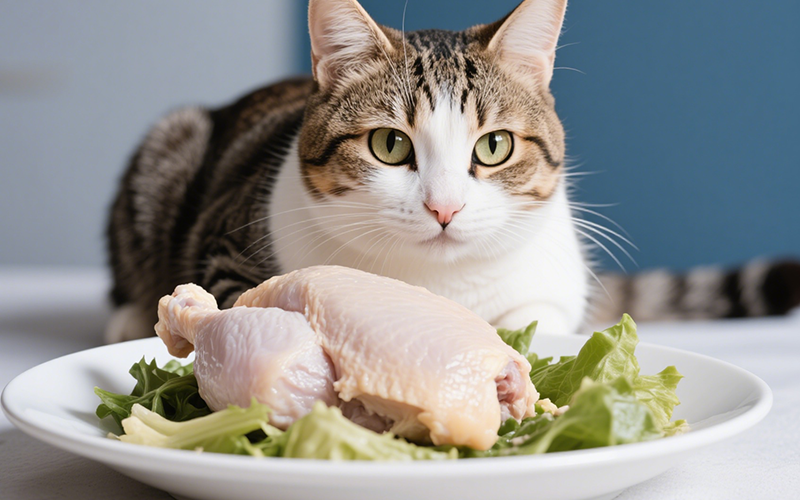
Boiled Chicken for Cats: A Purrfectly Safe Treat or Potential Pitfall? (Vet-Reviewed Guide)
- 15 Apr 2025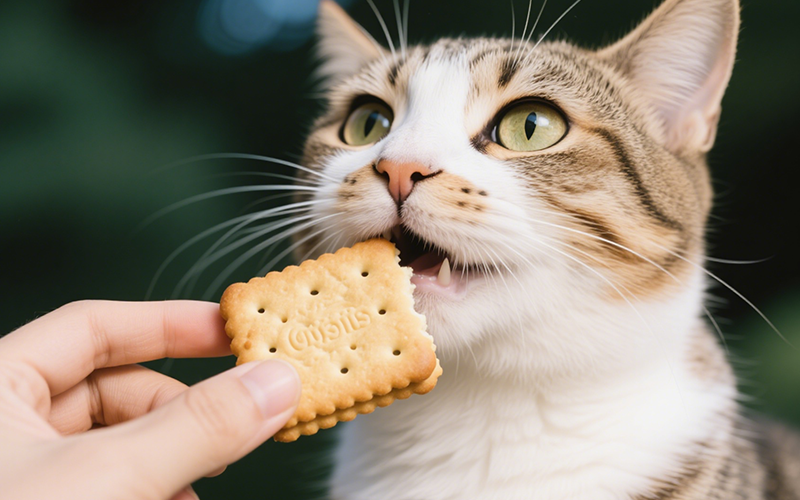
The Crumbly Truth: Can Cats Eat Biscuits Safely? Vet Warns of Hidden Dangers
- 15 Apr 2025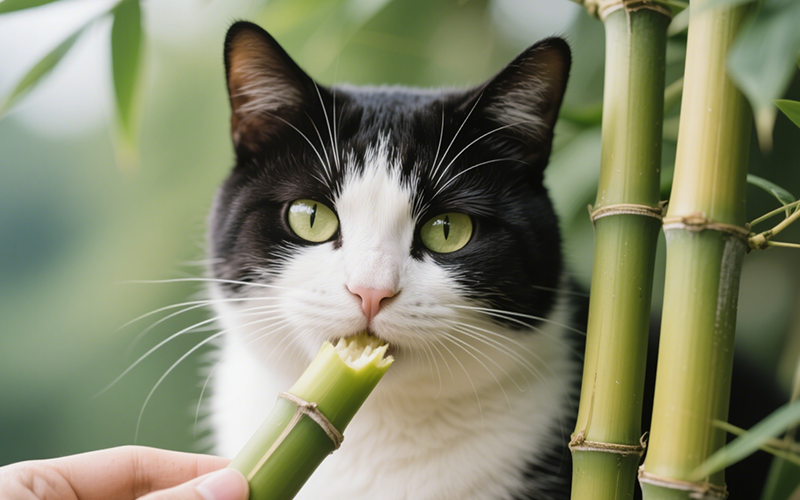
Green Stalks & Curious Cats: Can Cats Eat Bamboo Safely? (Vet-Reviewed Guide)
- 15 Apr 2025
Beef Liver for Cats: Nutrient Powerhouse or Risky Treat? (Vet-Reviewed Safety Guide)
- 15 Apr 2025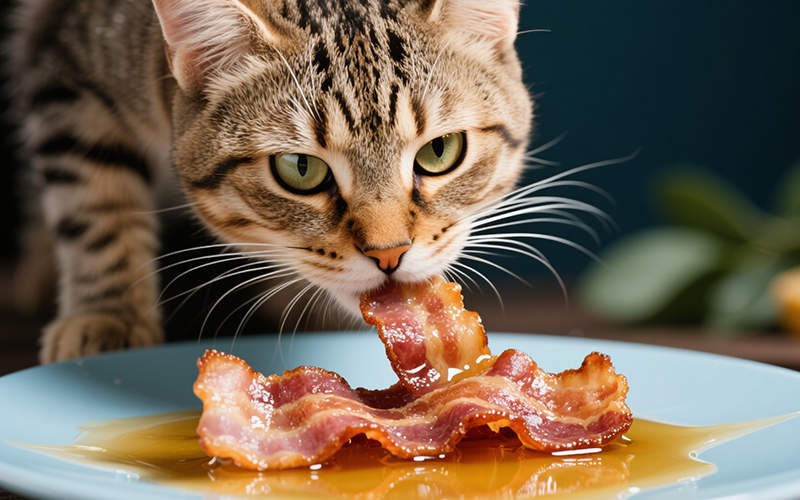
Fat Trap Alert: Can Cats Eat Bacon Grease Safely? (Vet-Reviewed Dangers)
- 15 Apr 2025
